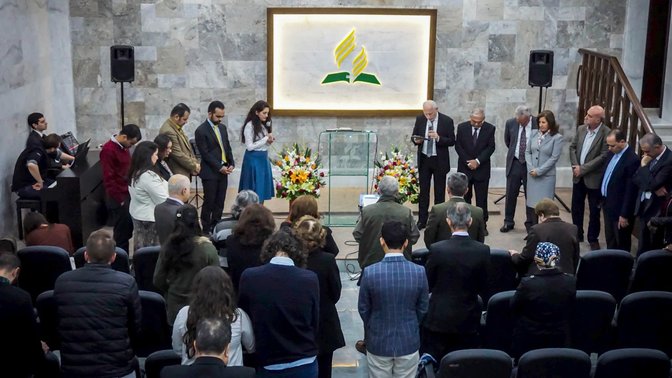
The Seventh-day Adventist community inaugurated its first church in Erbil, the capital city of the Iraqi Kurdistan region, on Sunday, February 25. During the first service in the new church building on the Sabbath before, the church members reflected on the past years, the challenges faced and the blessings achieved. On the 25th, the official opening ceremony included local authorities and representatives from the headquarters of the Middle East and North Africa Union.
Gilberto Araujo, director of the East Mediterranean Region that covers Iraq, Lebanon, Jordan, and Syria, expressed his gratitude for the support from the Middle East and North Africa Union (MENA).
“We would like to express its appreciation to the local authorities in Kurdistan for allowing us to freely and peacefully worship,” said Araujo. “At the same time, we thank MENA for its financial help and leadership.”
Local authorities congratulated the Seventh-day Adventist community on the dedication of the new church at the inauguration ceremony.
“Dozens of churches were opened in Kurdistan Region, showing the coexistence of different nations and religions in the region,” said Pshtiwan Sadiq, acting minister of Endowment and Religious Affairs.
Church leaders encouraged the members to share God’s hope and love with the community in spite of the sufferings they have endured.
“This inauguration shows that there is a future for the gospel in the country,” said Tibor Szilvasi, executive secretary of the Middle East and North Africa Union.
It was a memorable day for the members of the Adventist church in Iraq, which had been much stronger in the past until many conflicts happened in the region and the church’s presence became weak in the country.
The Beginning in Iraq[AdSense-A]
In 1923, Adventist gospel workers began their work in the city of Mosul, 250 mi (400km) north of Bagdad. Later Adventist schools and a hospital were built in the city.
In 1958, the first Adventist church in Iraq was opened in Baghdad, the capital city of Iraq. During the peak of the Adventist presence in the country, there were four churches in the cities of Mosul, Baghdad, Kirkuk and Basrah with a total membership of nearly 200 people.
Political Upheavals
In the 1970s, although the government nationalized Adventist institutions such as schools and a hospital, Iraqi Adventists still had the freedom to worship so churches were kept open.
However, the country suffered from several wars with Iran from1980 through 1988 and with the United States in 2003. Due to the wars and instability, many members left the country and the church was severely affected.
All the Adventist churches in the country started to close one by one, until the last church in Baghdad had to shut its door and there were no members left.
“It was a really stressful period for the church,” said George Yousif, an Iraqi Adventist member of the Erbil church.
New Beginning and Challenges
In 2011, indigenous and expat Adventists from Bagdad, Nicaragua, and Brazil began to gather together to worship in Erbil. The worshiping group grew in number particularly as the Adventist church’s humanitarian agency, Adventist Development and Relief Agency (ADRA) came to the region to work for refugees and Internally Displaced People(IDP).
In 2015, the church encountered another crisis when military operations started against the Islamic State (ISIS) in the city of Mosul, 51mi (81km) west of Erbil. However, the crisis didn’t stop church members from worshiping together.
Next Steps
With the new building, the church can receive more people than before and it is planning various projects to serve the community members.
Rick McEdward, president of the church’s regional headquarters in Beirut, Lebanon, believes that being a light in the community should be the main focus of the new facility.
“As Adventists we are called to bring hope to the world, after years of years of crisis it is a great moment to see a new church opened to serve the community,” said McEdward. “We are grateful to God for the freedom to open a place of prayer and service in order to bring God’s love to the world.”



